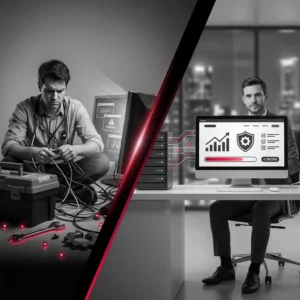As a business website owner, you should know the importance of a fast and efficient website. A slow website not only frustrates visitors but also negatively impacts your search engine rankings. In this blog, we’ll dive into the world of WordPress optimisation and provide you with valuable insights and practical tips to supercharge your site’s performance.
The Need for Speed: Why Website Performance Matters
When it comes to websites, speed matters — a lot! Did you know that 47% of visitors expect a website to load within two seconds or less? A slow-loading site can lead to high bounce rates, reduced conversions, and a diminished user experience. Moreover, search engines like Google consider website speed as a ranking factor, meaning that a sluggish site might struggle to appear in top search results.
To ensure your WordPress website performs at its peak, you need to address various factors that can affect speed. These include hosting, theme selection, image optimisation, plugin management, and more. We’ll explore each of these aspects in detail, equipping you with the knowledge to optimise your site for lightning-fast loading times.
Choosing the Right Hosting Provider
Your hosting provider plays a crucial role in determining your website’s speed and overall performance. When selecting a hosting provider, opt for one that offers high-speed servers, solid-state drives (SSDs), and advanced caching mechanisms. A reliable hosting provider will ensure your website loads quickly, handles high traffic volumes and experiences minimal downtime.
Furthermore, consider the scalability and support offered by the hosting provider. As your website grows, you’ll need a hosting plan that can accommodate increased traffic without compromising performance. Look for providers that offer dedicated hosting or managed WordPress hosting for optimal speed and scalability.
Streamlining Your Theme
The theme you choose for your WordPress website can significantly impact its speed. While visually appealing themes may catch your eye, they can come at the cost of increased loading times. Opt for lightweight and well-coded themes that prioritize performance. These themes often come with fewer unnecessary features and offer better compatibility with optimisation techniques.
To further boost your theme’s speed, make sure to keep it updated. Theme developers frequently release updates to enhance performance, security, and compatibility with the latest WordPress version. Regularly updating your theme ensures you can take advantage of these improvements and keep your website running smoothly.
This is even more important where you are using a page-builder such as Elementor to style your site as the features in your theme may well be redundant. We recommend using the lightweigh theme Hello Elementor if this is the case – it’s stripped back for speed and much faster than alternatives.
Optimising Images for Faster Loading
Images are an essential component of any website, but they can also be a major contributor to slow loading times. To strike a balance between visual appeal and speed, it’s crucial to optimise your images. Start by resizing images to the dimensions required by your website layout. Avoid uploading large images and relying on HTML or CSS to scale them down since this adds unnecessary load to your site.
Additionally, compress your images without compromising quality. Various plugins and online tools are available that can compress your images without significant loss in visual fidelity. By reducing the file size of your images, you’ll significantly improve your website’s loading speed and enhance the user experience.
Mastering Plugin Management
Plugins are fantastic tools that extend the functionality of your WordPress website. However, using too many plugins or poorly coded ones can slow down your site. It’s important to regularly review your plugins and deactivate or remove any that are no longer necessary.
Prioritise quality over quantity when selecting plugins. Look for reputable developers with a track record of creating lightweight and well-optimised plugins. Additionally, consider using performance optimisation plugins specifically designed to improve your website’s speed. These plugins often offer features such as caching, minification, and lazy loading, all of which contribute to a faster website.
Conclusion
You’ve reached the end of our guide on speeding up your WordPress website! We’ve covered crucial aspects such as selecting the right hosting provider, streamlining your theme, optimising images, and mastering plugin management. By implementing the tips and tricks we’ve discussed, you’ll be well on your way to a lightning-fast WordPress website that impresses visitors and ranks higher in search engine results.
Remember, website speed is a continuous effort. Regularly monitor your website’s performance, conduct speed tests, and stay updated with the latest optimisation techniques. By consistently investing in your site’s speed, you’ll provide an exceptional user experience, increase conversions, and stay ahead of the competition.
Want us to take care of all this for you?
Managing website performance is one of the key areas we focus on within our Website Care Plans. If you would like to leave it to the experts, we will carry out the activity we have spoken about in this article, along with proactive measures to improve reliability, availability, and security from just £30/m – a small price for peace of mind.







